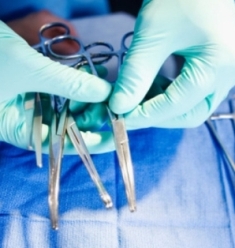Healthcare sector faces official scrutiny
 (CNS): Health officials announced today that after a considerably planning period and lot of work all health care facilities in the Cayman Islands will now be subject to official inspection based on a set of legal standards. The Health Practice Commission’s National Standards for Health Care Facilities has been published and in conjunction with the Health Practice Law almost 60 premises will now be inspected at least annually and in addition some 900 health care practitioners will also bemonitored.
(CNS): Health officials announced today that after a considerably planning period and lot of work all health care facilities in the Cayman Islands will now be subject to official inspection based on a set of legal standards. The Health Practice Commission’s National Standards for Health Care Facilities has been published and in conjunction with the Health Practice Law almost 60 premises will now be inspected at least annually and in addition some 900 health care practitioners will also bemonitored.
Officials said that inspections of all health care facilities will start this month and explained why so much time had passed since the law was passed in 2008 before the inspections started.
“To be fair to all health care facility owners, we did not want to start inspections before the National Standards was formally published,” said Department of Health Regulatory Services’ Director Mervyn Conolly. “Now that is has been made public, we can move forward with the implementation of the section of the Health Practice Law which calls for the inspection of all health care facilities.”
He said it was the culmination of years of hard work and an intensive consultation process, necessary for arriving at an appropriate and meaningful inspection process for the Cayman Islands. “We are always mindful of the fact that the department and the Islands’ health care practitioners are partners when it comes to ensuring ensure quality care for the Cayman Islands,” he added.
To fulfill its mandate of inspecting all medical premises, Health Regulatory Services appointed its first Health Practice and Facilities Inspector, Barrie Quappé in September 2009 to the Health Practice Commission.
“It was a long process, but we can now start inspections confident in the fact that we not only received ample input from stakeholders, but we also made sure to give them reasonable notification of the changes to come,” Quappé said.
Prior to finalizing the National Standards, Quappé said she had met with stakeholders and made presentations to several groups, including the Cayman Islands Nursing Association, Health Services Authority senior managers, certified medical facility representatives, the Pharmacy Association, and the Cayman Islands Medical and Dental Society.
She outlined the development of the National Standards, the requirements in the Health Practice Law and explained how inspections will be conducted.
The Inspector also coordinated with other government agencies such as the Fire Services, the Department of Environmental Health, Petroleum Inspectorate – that have inspection responsibilities to ensure efficient enforcement which prompted revisions to the National Standards.
The National Standards for Health Care Facilities is available online at www.dhrs.ky.
The law also provides for improvement notices, prohibition notices, appeals and possible penalties. Sections 15 (1) states that: “Whoever operates a health care facility without a certificate is guilty of an offence and liable on summary conviction to a fine of fifty thousand dollars and a further fine of ten thousand dollars for every day during which the facility is operated without a certificate.”
The Health Practice and Facilities Inspector is tasked with enforcing the National Standards for Health Care Facilities and certain aspects of the Health Practice Law. Section 16 (5), (a) – (d) of the Health Practice Law (2005 Revision) details the duties and powers of the Health Practice and Facilities Inspector, such as developing and implementing a comprehensive inspection programme, researching and establishing standards, policies and guidelines for health facilities to bring these in line with the country’s health practice legislation and registration regulations.
The health practice and facilities inspector will be responsible for all Cayman’s health care facilities. Medical facilities will receive a National Standards checklist when they are notified of a pending inspection. This will help the facilities manager to prepare staff for the inspection process.
If a facility is not up to standard, the inspector will issue a tentative notification of non-compliance, giving the owner/staff time to make the necessary upgrades. If the owner/staff fail to comply, the facility will be noted as being in violation of the Health Practice Law and the National Standards.
The law seeks to ensure safe and quality health care as according to the Landmark Institute of Medicine (“IOM”) between 44,000 and 98,000 people die annually as a result of medical errors. The HPC’s goal is to support the health care industry’s efforts to provide quality health care in safe environments to all their patients and clients in the Cayman Islands. “As a health care industry, all stakeholders and patients have a vested interest in maintaining and exceeding excellent standards of care,” Quappe said.
Category: Health


More cost. Do we need this?
Good luck Ms. Barrie you have a great challenge ahead of you and we wish you nothing but success for the health and well-being of all these islands residents.
I suggest that the inspections start with observing the mold in the postnatal rooms at the maternity ward in the George Town Hospital … I am not sure, but certainly would hope that it would be considered substandard if not blatantly dangerous (although I was assured by the Canadian nurse on duty that it was to be expected in the Caribbean).